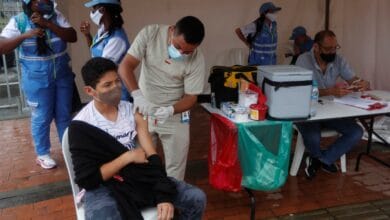Iran detains over 100 suspects in schoolgirl poisoning

Tehran, Mar 12 (EFE).- More than 100 suspects have been detained for their alleged involvement in a series of mysterious poisoning of thousands of schoolgirls in Iran, the interior ministry said.
Iran has attributed the wave of poisoning to “enemies” of the nation who tried to “instill a reign of terror among students” with “hostile motives.”
The government has said it was probing “possible links” of the opposition group, Mujahideen-e-Khalq (MEK) based in Albania, with the serial poisoning of schoolgirls.
“More than 100 people were identified, arrested, and investigated for their involvement in the recent incidents in schools,” said an interior ministry statement issued late on Saturday.
The ministry said the perpetrators wanted to create fear and force “the closure of schools” and spark skepticism towards the system in the Islamic republic.
Around 5,000 girls from 230 schools across 25 provinces have fallen sick since the poisonings began in the Shia holy city of Qom in November, according to lawmaker Mohammad-Hassan Asafari, a probe panel member.
The wave of poisoning began amid heightened protests sparked by the alleged custodial death of a 22-year-old Kurdish woman, Mahsa Amini.
Those affected report symptoms including headache, dizziness, nausea, and sometimes inability to move limbs after detecting a smell of rotten orange and cleaning products.
The mysterious wave of poisonings has sparked widespread anger, especially among parents.
Parents, students, and teachers took to the streets in several cities to protest last week.
The government has said the vast majority of affected people fell sick due to “anxiety” and just “less than 10 percent had real symptoms.”
Supreme leader Ali Khamenei has described the attacks as an “unpardonable crime.”
Khamenei affirmed that if it was proven that the poisoning was done deliberately, the perpetrators should “receive the maximum punishment,” which is death in Iran.
Iran’s President Ebrahim Raisi has blamed the poisonings on “enemies” of the country, often used to refer to the United States and Israel.
In Iran, female education has not been questioned in the 43 years of existence of the Islamic Republic.
But some people link the poisonings with the protests in the wake of Amini’s death in police custody on Sep.16 last year.
The Kurdish woman was detained by the morality police on Sep.13 allegedly for improperly donning her hijab.
The months-long unrest evolved into demands calling for the end of the Islamic republic founded by Ayatollah Khomeini in 1979.
Protesters took to the streets, demanding women’s rights.
School students took part in the anti-government protests and took off their veils, shouting “woman, life, freedom.”





